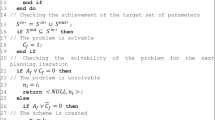Abstract
The article considers the problem of planning computing tasks in hybrid supercomputer systems using the example of the Polytechnic Supercomputer Center. We have explored the classes of tasks using the distribution of calculations planning and shown their specific character when using hybrid supercomputer resources. With this in mind, we have developed the algorithms to optimize the use of resources of supercomputer systems. Furthermore, we have proposed an algorithm predicting task execution time taking into account the characteristics of the computation node and task parameters. Finally, after conducting the research we have compared the developed algorithms.
Similar content being viewed by others
References
Popov, E.N., Barantsev, K.A., Litvinov, A.N., Kuraptsev, A.S., Voskoboinikov, S.P., Ustinov, S.M., Larionov, N.V., Liokumovich, L.B., Ushakov, N.A., and Shevchenko, A.N., Frequency line of nuclear magnetic resonance in quantum rotation sensor: Negative effect of detection circuit, Gyroscopy Navig., 2017, vol. 8, no. 2, pp. 91–96.
Lukashin, Al. and Lukashin, An., Resource scheduler based on multi-agent model and intelligent control system for OpenStack, Lect. Notes Comput. Sci., 2014, vol. 8638, pp. 556–566.
Ross, G.T. and Soland, R.M., A branch and bound algorithm for the generalized assignment problem, Math. Progr., 1975, no. 8, pp. 91–103.
Blazewicz, J., Ecker, K., and Pesch, E., Handbook on Scheduling, in From Theory to Applications, Berlin: Springer, 2007.
Leung, J.Y., Handbook of Scheduling. Algorithms, Models and Performance Analysis, Boca Raton: CRC Press, 2004.
Gergel, V.P. and Polezhaev, P.N., The study of parallel job scheduling algorithms for cluster computing systems using a simulator, Bull. Nizhni Novgorod Lobachevsky Univ., 2010, vol. 5, no. 1, pp. 201–208.
Martello, S. and Toth, P., Knapsack Problems, New York: Wiley, 1990.
Kolesar, P.J., A branch and bound algorithm for the knapsack problem, Manage. Sci., 1967, no. 13, pp. 723–735.
Cohen, R., Katzir, L., and Raz, D., An efficient approximation for the generalized assignment problem, Inf. Process. Lett., 2006, vol. 100, no. 4, pp. 162–166.
Author information
Authors and Affiliations
Corresponding author
Additional information
The article is published in the original.
About this article
Cite this article
Ilyashenko, A.S., Lukashin, A.A., Zaborovsky, V.S. et al. Algorithms for planning Resource-Intensive computing tasks in a hybrid supercomputer environment for simulating the characteristics of a quantum rotation sensor and performing engineering calculations. Aut. Control Comp. Sci. 51, 426–434 (2017). https://doi.org/10.3103/S0146411617060049
Received:
Published:
Issue Date:
DOI: https://doi.org/10.3103/S0146411617060049




